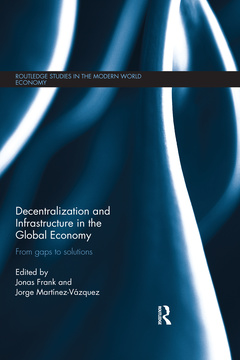Decentralization and Infrastructure in the Global Economy From Gaps to Solutions Routledge Studies in the Modern World Economy Series
Coordonnateurs : Frank Jonas, Martinez-Vazquez Jorge

The subnational dimension of infrastructure has emerged as one of the greatest challenges in contemporary public finance policy and management. Ensuring the efficient provision of infrastructure represents a challenge for all countries irrespective of their level of centralization or decentralization. This book proposes an innovative approach for the strengthening of decentralized public investment and infrastructure management.
Decentralization and Infrastructure in the Global Economy: From Gaps to Solutions covers the most important aspects of infrastructure investment in a decentralized setting. It discusses infrastructure gaps and the quality of subnational spending; how functional responsibilities, financing and equalization can be designed; sector-specific arrangements in high expenditure areas, such as health, education and roads; key steps of the public investment cycle and management; and analyses the political economy and corruption challenges that typically accompany decentralized infrastructure projects.
This book challenges some of the well-accepted principles of intergovernmental fiscal relations and will be useful to researchers and practitioners of public finance policy and management.
1. Decentralization and Infrastructure: From Gaps to Solutions A. Measuring Infrastructure Gaps: Quantity and Quality Perspectives 2. The Infrastructure Gap and Decentralization 3. Trends and Quality of Spending of Decentralized Public Investment B. Fundamentals in Flux: Functions, Finance, and Equalization for Decentralized Public Investment 4.Principles and Practice 5. Financing Infrastructure 6. Capital Infrastructure and Equity Objectives in Decentralized Systems C. Sectoral perspectives 7. Investing in Health Infrastructure: How Decentralization Matters 8. Educational Infrastructure, School Construction and Decentralization in Developing Countries: Key Issues for an Understudied Area 9. Rural Roads: The Challenge of Decentralized Implementation D. Investing into the Invisible: Management and Coordination of Decentralized Public Investment 10.The Challenge of Operating and Maintaining Infrastructure 11. Multi-Tier Monitoring of Infrastructure: Top Down and Bottom Up 12. Coordination of Infrastructure Investment across Levels of Government E. The Political Economy and Corruption Challenges 13. The Political Economy of Local Infrastructure Planning 14. Decentralized Provision of Public Infrastructure and Corruption
Jonas Frank is Senior Public Sector Management Specialist, Global Unit for Public Sector Governance, Poverty Reduction and Economic Management, World Bank, Washington DC, USA
Jorge Martínez-Vázquez is Regents Professor of Economics and Director of the International Center for Public Policy, Andrew Young School of Policy Studies, Georgia State University in Atlanta.
Date de parution : 09-2020
15.6x23.4 cm
Date de parution : 07-2015
15.6x23.4 cm
Thèmes de Decentralization and Infrastructure in the Global Economy :
Mots-clés :
subnational; government; investment; services; service; delivery; intergovernmental; grants; gaps; MNA; capital; IMF World Economic Outlook Database; Public Infrastructure; Central Government; Subnational Governments; Sub-national Governments; Pe Rc; La Ut; Ta Ge; Infrastructure Services; Decentralized Infrastructure; Local Infrastructure Planning; Infrastructure Gaps; World Development Report; Local Development; Infrastructure Service Delivery; Subnational Planning; PPPs; Public Private Partnerships; Decentralized Development Planning; Maintenance Expenditures; Rural Roads; Lac Country; Decentralization Reforms; Intergovernmental Grants


